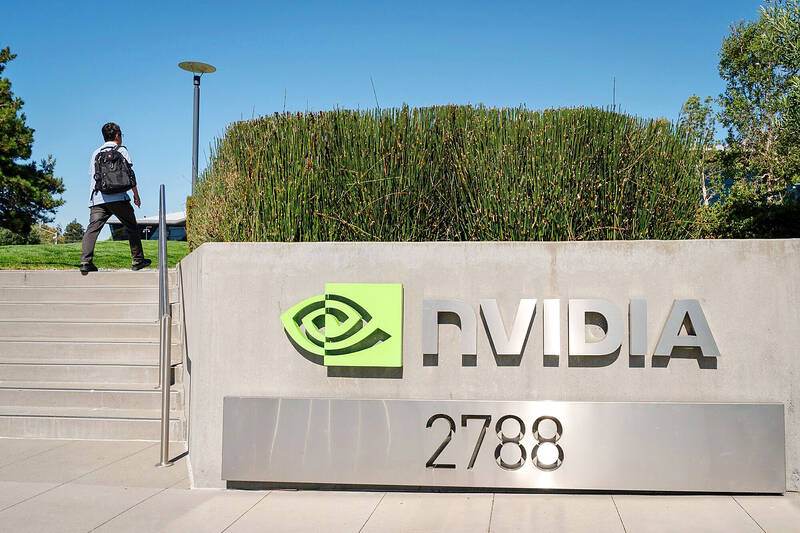The US Department of Justice has sent subpoenas to Nvidia Corp and other companies as it seeks evidence that the chipmaker contravened antitrust laws, an escalation of its investigation into the dominant provider of artificial intelligence (AI) processors.
The department, which had previously delivered questionnaires to companies, is now sending legally binding requests that oblige recipients to provide information, people familiar with the investigation said.
That takes the government a step closer to launching a formal complaint.

Photo: Bloomberg
Antitrust officials are concerned that Nvidia is making it harder to switch to other suppliers and penalizes buyers that do not exclusively use its AI chips, said the people, who asked not to be identified because the discussions are private.
Nvidia shares, which suffered a record-setting rout on Tuesday, fell further in late trading after Bloomberg reported on the subpoenas.
Still, the stock has more than doubled this year — fueled by explosive sales growth at the Santa Clara, California-based chipmaker.
In response to questions about the probe, Nvidia said that its market dominance stems from the quality of its products, which deliver faster performance.
“Nvidia wins on merit, as reflected in our benchmark results and value to customers, who can choose whatever solution is best for them,” Nvidia said in a statement.
Nvidia has drawn regulatory scrutiny since becoming the world’s most valuable chipmaker and a key beneficiary of the AI spending boom. Sales have been more than doubling each quarter, and it has eclipsed onetime chip leaders such as Intel Corp.
In the probe, regulators have been investigating Nvidia’s acquisition of Run:ai, a deal announced in April. That company makes software for managing AI computing, and there are concerns that the tie-up would make it more difficult for customers to switch away from Nvidia chips.
Regulators also are inquiring whether Nvidia gives preferential supply and pricing to customers who use its technology exclusively or buy its complete systems, the people said.
Separately, Nvidia has joined a US$100 million-plus funding round for Tokyo start-up Sakana AI.
Sakana, founded last year by a pair of former Google engineers, said it would team up with Nvidia on research, data center access and “AI community-building” locally.
Sakana plans to train low-cost generative AI models using small datasets. Its team unveiled several AI models for Japanese speakers this year.
Nvidia chief executive officer Jensen Huang (黃仁勳) said he was drawn to Sakana’s endeavors in Japan to popularize AI.
“Countries are embracing sovereign AI to capture and codify their data, culture and language through their own unique large language models,” Huang said. “The team at Sakana AI is helping spur the democratization of AI in Japan.”

MULTIFACETED: A task force has analyzed possible scenarios and created responses to assist domestic industries in dealing with US tariffs, the economics minister said The Executive Yuan is tomorrow to announce countermeasures to US President Donald Trump’s planned reciprocal tariffs, although the details of the plan would not be made public until Monday next week, Minister of Economic Affairs J.W. Kuo (郭智輝) said yesterday. The Cabinet established an economic and trade task force in November last year to deal with US trade and tariff related issues, Kuo told reporters outside the legislature in Taipei. The task force has been analyzing and evaluating all kinds of scenarios to identify suitable responses and determine how best to assist domestic industries in managing the effects of Trump’s tariffs, he

TIGHT-LIPPED: UMC said it had no merger plans at the moment, after Nikkei Asia reported that the firm and GlobalFoundries were considering restarting merger talks United Microelectronics Corp (UMC, 聯電), the world’s No. 4 contract chipmaker, yesterday launched a new US$5 billion 12-inch chip factory in Singapore as part of its latest effort to diversify its manufacturing footprint amid growing geopolitical risks. The new factory, adjacent to UMC’s existing Singapore fab in the Pasir Res Wafer Fab Park, is scheduled to enter volume production next year, utilizing mature 22-nanometer and 28-nanometer process technologies, UMC said in a statement. The company plans to invest US$5 billion during the first phase of the new fab, which would have an installed capacity of 30,000 12-inch wafers per month, it said. The

Taiwan’s official purchasing managers’ index (PMI) last month rose 0.2 percentage points to 54.2, in a second consecutive month of expansion, thanks to front-loading demand intended to avoid potential US tariff hikes, the Chung-Hua Institution for Economic Research (CIER, 中華經濟研究院) said yesterday. While short-term demand appeared robust, uncertainties rose due to US President Donald Trump’s unpredictable trade policy, CIER president Lien Hsien-ming (連賢明) told a news conference in Taipei. Taiwan’s economy this year would be characterized by high-level fluctuations and the volatility would be wilder than most expect, Lien said Demand for electronics, particularly semiconductors, continues to benefit from US technology giants’ effort

‘SWASTICAR’: Tesla CEO Elon Musk’s close association with Donald Trump has prompted opponents to brand him a ‘Nazi’ and resulted in a dramatic drop in sales Demonstrators descended on Tesla Inc dealerships across the US, and in Europe and Canada on Saturday to protest company chief Elon Musk, who has amassed extraordinary power as a top adviser to US President Donald Trump. Waving signs with messages such as “Musk is stealing our money” and “Reclaim our country,” the protests largely took place peacefully following fiery episodes of vandalism on Tesla vehicles, dealerships and other facilities in recent weeks that US officials have denounced as terrorism. Hundreds rallied on Saturday outside the Tesla dealership in Manhattan. Some blasted Musk, the world’s richest man, while others demanded the shuttering of his